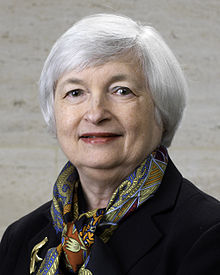There is an interesting article at Bloomberg now advocating for the re-appointment of Janet Yellen as Chair of the U.S. Federal Reserve when her term ends in the early part of 2018.
The article takes the view that Yellen has a better track record than any of the other favorites to be appointed to the post when it becomes vacant next year, arguing that she has consistently made correct calls on the primary issues around monetary policy over recent years, except meeting the inflation target. While this may be true, it doesn’t answer the separate question of who is likely to get the job. The post is at the appointment of the President of the United States, subject to confirmation by the Senate, and candidates must be selected from the pool of sitting Governors (who are also nominated by the President and confirmed by the Senate). So, the is whom will the President appoint, and will the Senate confirm them. 
I believe that President Trump is unlikely to appoint Yellen to a second term, as he will want to have some leverage over the Chair. If Trump reappoints Yellen she may start to look invulnerable. A new Fed Chair would be subject to the President’s re-nomination if he wins re-election to a second term in 2020. This could mean that a new Chair would have an incentive to please President Trump and in this way the President might be able to exercise most influence over monetary policy. A booming, job-producing economy is something that will be crucial to the President’s chances of securing re-election.
It could be argued, though, that the President might conclude that Yellen has a good record on job creation, and that therefore he does not need to worry about influence, as he already has a Fed Chair delivering the kind of policy he wants. Possibly the “jury” is still out and the President may be keenly watching how Yellen handles the transition towards a tighter monetary policy over the coming months.
